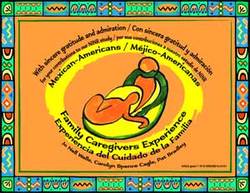TCU students and faculty research to give Mexican-American caregivers a voice in health care
 |
| Graphic was designed by Dr. Joseph Spence, father of researcher Dr. Carolyn Cagle. |
Fort Worth, TX
2/8/2007
By: Cacy Barnard
TCU Office of Communications
Micaella Saldaña knows firsthand the difficulties facing many Mexican-American caregivers trying to navigate the health care system. After helping her grandparents deal with language barriers in a hospital, Saldaña decided that Spanish-language educational resources for Hispanic families were few in number.
But Saldaña's experience led to more than just frustration. It also led to an opportunity to help the TCU Harris College of Nursing & Health Sciences conduct research on the challenges facing Mexican-American caregivers.
“The research was more of an interest than work for me,” said Saldaña. “I immediately wanted to help because I have seen the importance of effective communication from personal experience.”
Over a period of two years, and thanks to a nationally funded research project, Harris College of Nursing & Health Sciences professors Dr. Jo Nell Wells, Dr. Carolyn Cagle and Dr. Patricia Bradley, along with Saldaña, undertook the arduous task of identifying exactly what was missing from the health care system and what was needed to effectively help Mexican-American caregivers.
In the study, which included in-depth interviews of 34 female Mexican-American caregivers of cancer patients, one of the caregivers voiced statements such as, “That kind of education is not really given to Hispanic people. Even less for the people who do not speak English. We don't know English. I did not know how to talk to the doctor.”
Another caregiver stated, “Once they gave me a book to find out what type of cancer it was, but it was in English. I don't know how to read in English.”
This pervasive theme led the research team to apply for Vision in Action (VIA) funding from TCU. With VIA funding, the team hired Saldaña and other student research assistants (RAs) to assist in a follow-up study titled “Educational Material Availability, Preferred Learning Format, and Health Literacy of Mexican-American Cancer Caregivers”.
Saldaña, a bilingual student from Mission, TX, who makes frequent visits to her relatives in Mexico, jumped at the opportunity to interact with the caregivers. Through interviews, she helped to confirm that Mexican-American caregivers desire to understand the illnesses and would benefit from resources presented in their native language.
To begin the research, Saldaña and other RAs surveyed and cataloged the educational materials available at three community sites, including John Peter Smith Center for Cancer Care, Harris Cancer Library and Cancer Care Services. They continued with research on the availability of materials in Spanish, the reading level of the materials and other characteristics of the materials. The research team and the RAs then returned to the John Peter Smith Center for Cancer Care to conduct interviews with 11 Mexican-American women who were caregivers of family members with cancer.
“It was touching to interact with each of the caregivers and see how much could and should be done to improve their situation,” said Saldaña.
They found 45 percent of the materials were only available in English while 64 percent of the study participants read in Spanish. Additionally, while the participants’ educational length ranged up to 14 years, the average was 9.5 years. Much of this schooling took place in Mexico, with 78 percent being born in Mexico. Meanwhile, the readability level of the material was at the 10.5 grade level with many of the materials written at the 12th grade level. The educational materials were not immediately apparent in two of the three agencies. When asked about preferred learning format, the participants leaned toward interaction with other caregivers or family members instead of learning activities practiced alone. At least nine out of 11 chose the interactive options.
Preliminary findings of the VIA study, still in progress, were presented by Dr. Wells and Saldaña in November at the national convention of the American Public Health Association in Boston. The principal author of the research presentation was Dr. Patricia Bradley, but Saldaña also contributed, as did Dr. Wells and Dr. Cagle. The presentation suggested routinely handing caregivers a packet of brochures when a patient enters the system of care (in their language and written at the fifth grade reading level). The team made many other recommendations for clinical practices as well as for further research.
The research project has allowed the input of female Mexican-American caregiver voices to be heard. “Changes in the overall communication would lead to better responses and better care for the patient in the long-run. Caregivers really want to understand how best to help the patient,” said Saldaña who hopes to see progress during her future health care career.
This study is one step towards making that happen.
-30-










